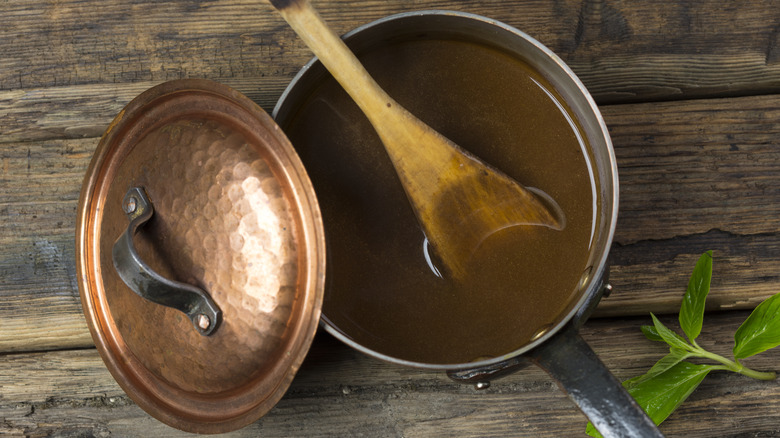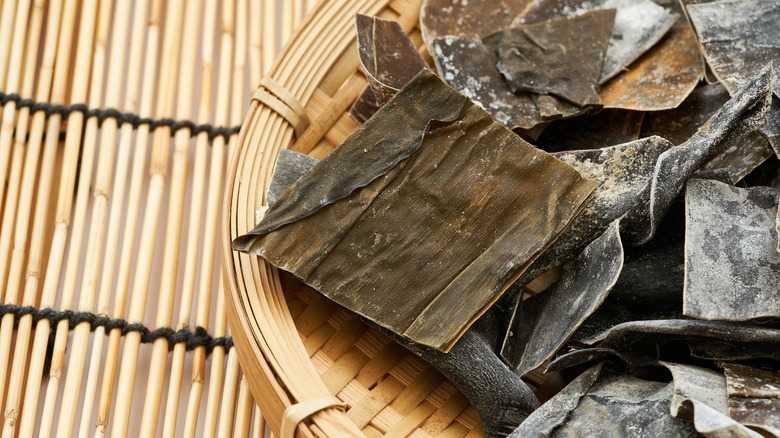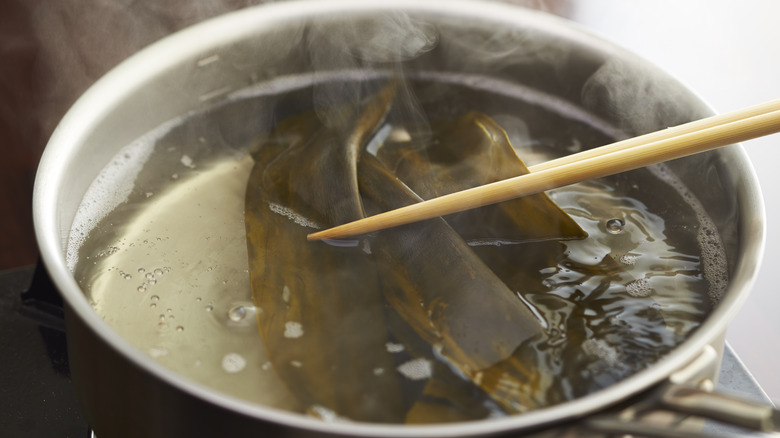The Dairy-Free Ingredient That Thickens Sauces And Packs Flavor
When thickening sauces, soups, and other liquidy dishes, there are a few pantry ingredients you can reach for to get the job done. Cornstarch and flour both have their merits, but whisking to blend out the granules of these powdery add-ins can be a challenge if you're not careful. Dairy products like butter, heavy cream, or yogurt can be good choices, but sometimes a dairy-free dish is what you need. When those standbys just don't suit your needs, there's another option you can try: kombu.
Yes, kombu — the seaweed, or kelp, used most famously in dashi, a stock that forms the base of many Japanese dishes. This dried ingredient contains alginate, a polysaccharide that acts as what's known as a hydrocolloid, or gelling agent. Other hydrocolloids include pectin and gelatin, both also used as thickeners in culinary practices.
Dropping some dried sheets of kombu into a liquid and boiling it or simmering it releases the alginates, causing the liquid around it to thicken. And unlike butter or heavy cream, kombu has no dairy — and is much lower in calories. At the same time, it brings a burst of savory flavor to whatever dish it's added to; perfect for adding a salty spin to your favorite dish.
What is kombu and what does it taste like?
Kombu is a form of brown algae, grown and gathered on the coasts of Hokkaido. There are a number of different varieties of kombu, each harvested from a different region. Though each has its own strengths and weaknesses in the kitchen, in general these dried sheets of seaweed can be used in much the same way.
The seaweed is sold and prepared in various different ways, including pickled kombu, powdered kombu, and shredded varieties. If you're looking to harness this kelp's thickening properties, though, go for the dried sheets of kombu and cut off strips to simmer in your dishes.
Be aware before diving in headfirst, though: simmering your sauces or soups with kombu will impart a deep umami flavor. Some kombu varieties can contain upwards of 2000 to 3000 milligrams of glutamate, the compound that imparts umami flavors, per 100 grams. Kombu flavor is salty-sweet and has a light brininess to it; when using it, be sure to consider whether it works with the flavor profile of the sauce or other dish you're adding it to.
Health benefits of using kombu
Besides being a natural thickener and a way to impart major umami flavor into your sauces and stews, kombu also provides a host of health benefits to any dish it's added to. Kombu is naturally high in iodine, an element that helps manage the thyroid's hormone production and calibrate metabolism. On top of that, it contains compounds that reduce cholesterol and prevent hypertension, as well as providing calcium, iron, and both vitamins A and C. That's a lot of nutrition packed into a small, flavorful, low-calorie package.
One more interesting quality about kombu: The glutamic acid it contains naturally tenderizes beans, breaking down the compounds in the legumes that cause gas in your digestive system. This helps alleviate intestinal discomfort after eating bean-heavy meals. Consider that when you're next thinking about how to thicken your three-bean soup or chili — and throw a strip of kombu into the pot.


